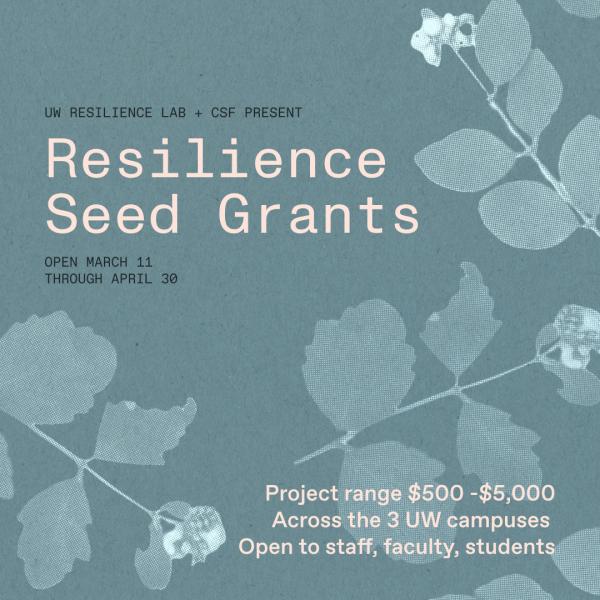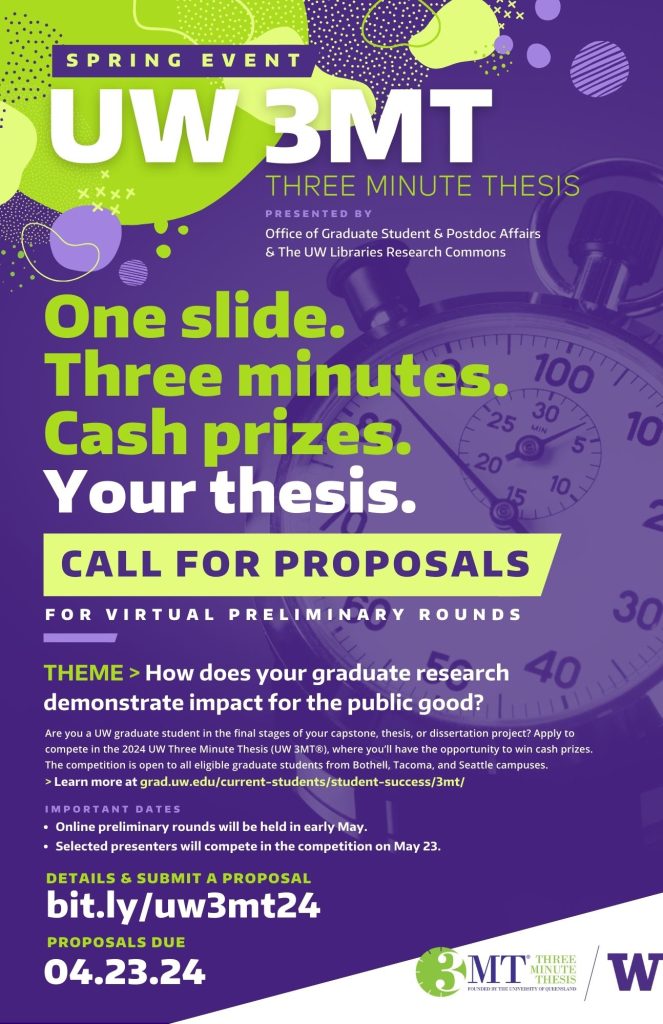SSW MSW Blog

2024 Resilience and Compassion Seed Grant
Posted under Money Matters, Research, Social Justice, Student Opportunities - research, Student Resources on Apr 12, 2024
The UW Resilience Lab and the Campus Sustainability Fund (CSF) are pleased to share the 2024 Resilience and Compassion Seed Grant cycle is accepting applications! The application form will remain open until Tuesday, April 30, 2024.
Read more: 2024 Resilience and Compassion Seed GrantThese small grants (<$5,000) support efforts to promote resilience, compassion and sustainability and foster connection and community at the UW. Seed grants support impactful activities, programming, projects and/or applied research that align with the following goals of the Resilience Lab and the CSF:
- To cultivate kindness, compassion and gratitude toward each other and ourselves;
- To foster connectedness, belonging and community;
- To embrace common humanity and diversity within the human experience;
- To provide opportunities to the UW community for project-based or applied learning;
- To illuminate the connections between group or personal identities (cultural, racial, ethnic, gender, etc.) and the sustainability of the UW community and environment.
- To educate and/or spark dialogue about environmental and societal problems that disproportionately impact Black, Indigenous and People of Color (BIPOC) communities.
All members of the UW community are eligible to apply – including students, staff and faculty across the three campuses; however, preference will be given to teams that include students.
Past funded project have included: workshops, retreats, community activities, social justice and anti-racist training, building connections between the Seattle community and UW, and applied research.
To apply, submit the following information and materials through the 2024 Resilience and Compassion Seed Grant application (Google form).
The short application includes a request for:
- A detailed, line-item budget proposal for how the funds will be used. Please include a description of matching funds and/or any additional funds to support your project as applicable.
- (Optional) Letter of support from an appropriate unit lead (e.g., person holding chair, dean or VP-level roles) or letter from a faculty or staff adviser/mentor for student-led applications.
Funding guidelines are listed on the 2024 Resilience and Compassion Seed Grant application. To learn more, check out former Resilience Seed Grant recipients, here.
Applications are due Tuesday, April 30 by 11:59 pm. Contact Rudy Gallardo, the Resilience Lab Coordinator (rodrig5@uw.edu) or Tatiana Brown, the CSF Associate Program Director (csfcoord@uw.edu) for any questions regarding the Seed Grant applications.

UW Three Minute Thesis (3MT)
Posted under Just for fun, Student Opportunities - research, Thesis Research on Apr 5, 2024
Are you a UW graduate student in the final stages of your capstone, thesis, or dissertation project? Submit a proposal to present at the online preliminary round in early May. Successful presenters from the preliminary round will move forward to compete at the 2024 UW Three Minute Thesis (3MT) Competition, with an opportunity to win First Place, Runner Up, or People’s Choice Awards. More information: https://grad.uw.edu/current-students/student-success/3mt/
The competition is open to all eligible graduate students from Bothell, Tacoma, and Seattle campuses.
– Virtual preliminary round: Early May 2024
– Competition day (In person): May 23, 2024, 3–4:30 p.m., Seattle campus
Call for Proposals – For Virtual Preliminary Round
Submit your proposal by April 23, 2024 by 11:59 p.m. (PT)
Questions? Contact: uw3mt@uw.edu

Graduate Staff Assistant (GSA) Position – 2024/25 Academic Year
Posted under Career information and Professional Development Opportunities, Job Opportunities, Student Opportunities - research on Mar 1, 2024
The Office of Undergraduate Research has an outstanding opportunity for a 50% FTE Graduate Staff Assistant appointment. The appointment period for this position is September 16, 2024 – June 15, 2025. The Office of Undergraduate Research provides resources and opportunities to support students, mentors, and staff across all disciplines to support the creation of transformative research experiences. The Graduate Staff Assistant position responsibilities will include advising, outreach, event and program planning, assessment, and providing administrative support for the Office’s many services.
Read more about this position.
Application due March 11 by 11:59 p.m.
Learn more about the Office of Undergraduate Research. Compensation and benefits will reflect the negotiated labor contract and salary schedule that govern academic student employees and are subject to union shop provisions.
School-Based Health Center (SBHC) – Student Project Opps – Apply by 10/1
Posted under Student Opportunities - research on Sep 22, 2023
School-Based Health Center (SBHC) – Student Project Descriptions
2023/24 School Year
Are you a graduate student looking for an opportunity to do a capstone, thesis, practicum or final project with real-word public health impact? We have two project opportunities with Public Health Seattle & King County that can offer great experience, a chance to apply evaluation skills, and make a difference in local public health!
BACKGROUND:
There are currently 36 comprehensive school-based health centers in King County offering medical and mental health services to over 10,000 K-12 students annually. Public Health-Seattle & King County’s School Based Partnerships Program (SBPP) issues grants to partner healthcare organizations that operate the clinics. The SBPP team has been working with the UW research team on evaluation efforts since 2021 focusing on issues of racial and educational justice in school-based health centers (SBHCs) and employing the equitable evaluation framework.
The SBPP Team in collaboration with the UW (Dr. Jenna van Draanen) has two potential student project ideas for the 2023/24 year (below). If there are other areas of interest to students beyond what is described below, interested students are encouraged to contact Erin MacDougall (emacdougall@kingcounty.gov) to propose alternative projects to discuss their alignment with this program’s work.
PROJECT DESCRIPTIONS:
Project 1: Understanding student experiences with SBHCs
It is vital to understand student experiences with care at SBHCs and what can be improved about the care they receive. Building off of a student project from 2022 that assessed the range of student satisfaction tools being used at SBHCs across King County, this project would aim to:
- Round with partners to see if a universal tool is desired.
- Work with PHSKC to finalize a process and a feedback tool that could be used system-wide;
- Coordinate pilot implementation of surveys across whole SBHC system;
- Conduct analysis of survey results from first 6 months of system-wide implementation to understand:
- What are student experiences with care at SBHCs in King County?
- Do students and families perceive the services they receive to be high quality? Culturally competent? Equitable?
Specific project methods, data collection, and analysis plans would be developed in collaboration with the SBPP team and the SBHC managers. Bi-weekly meetings with the SBPP team will be held to ensure regular touch points and communication and to help with project progress.
Project 2: Understanding logistical and systemic barriers to providing equitable, relevant, and culturally responsive care in SBHCs
Equitably serving students at SBHCs requires overcoming logistical and systemic barriers, both internal and external to the SBHC. Building from two student projects completed in 2022, one on gaining understanding of the use of clinical assessments around social determinants and health; and the other focused on describing providers’ approaches to providing equitable care in SBHCs, this project will aim to:
- Build on the previous two projects’ outcomes including conducting a landscape analysis of already available training, learning resources in the community and within own and other agencies to promote equity in healthcare practices.
- What kinds of trainings are agencies doing on equity and anti-racism and what is the method, frequency, and content of the existing trainings? How are sponsors assessing the impact of those trainings on provider practices, if at all?
- What learning opportunities do providers have to understand an integrate impacts of SDOH into student care and especially to help support strengths that students bring to their care plan?
- What else would they like to be doing?
- What other approaches are being used beyond training? (e.g. reflective practice, anti-racist practice groups, professional development goals, etc.)
- Gain understanding from SBHC providers and managers of needed additional resources and training focused on reducing logistical barriers to access and addressing inequities for students in schools with SBHCs.
- Are SBHCs learning from school communities what is needed and responding to that? How?
- What other ways are sponsor agencies identifying barriers and working to overcome them?
- Gain understanding from individual SBHC providers, SBHC care teams, and healthcare systems on their ideas for implementable strategies to reduce logistical barriers to access and addressing inequities in health care.
- What resources would help sponsor agencies and staff to reduce additional logistical barriers to access and addressing inequities?
- What would they like to do differently/try on? At what level do they plan to support change? (e.g. clinic, community, system levels)
- How can the PHSKC SBPP support efforts to try new approaches?
Specific project methods, data collection, and analysis plans would be developed in collaboration with the SBPP team and the SBHC managers. Bi-weekly meetings with the SBPP team will be held to ensure regular touch points and communication and to help with project progress.
CONTACT:
For students interested in capstone, thesis, practicum, or other final project opportunities, please reach out to Erin MacDougall emacdougall@kingcounty.gov by October 1 to discuss possibilities and potential fit.
We are committed to promoting antiracism, equity, diversity, and inclusion in our research. A diverse study team comprised of team members who share these values is an essential part of this commitment, as it helps us to be as responsive as possible to our participants’ diverse identities. We define diversity broadly and intersectionally, considering aspects of identity including but not limited to race, ethnicity, culture, country of origin, religion, gender, sexual orientation, and ability. When you email us to let us know you are interested, please describe in 2-3 sentences what you would bring to the team related to this commitment and why you are interested in school-based health center work.
